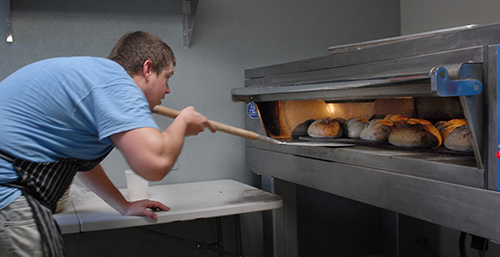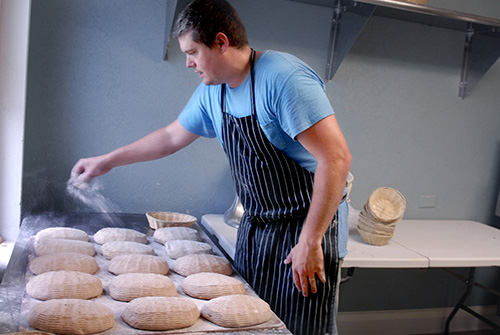
Cody Scogin shifts around loaves in his bread oven to get a perfect caramelized crust. He loves bread and hates the bad reputation commercial production has given bread. (PHOTO BY CLARE HOWARD)
In France, bread is still baked daily and consumed with every meal. The list of ingredients numbers three. In America, the culture of real bread baking died long ago. Now, bread is manufactured by Wall Street corporations. It has a shelf life of weeks. Understanding the list of ingredients requires a chemical background. It is baked using “dead” flour because the wheat’s bran containing oil is removed to preserve shelf life. “Enrichments” are added in a futile attempt to compensate.
One 29-year-old man from Mackinaw is fighting back.
The temperature edges up toward 100 degrees in the kitchen as Cody Scogin tosses flour over his loaves and scores the dough before inserting 12 loaves onto the deck of his American Baking Systems oven.
Scogin is the “bread guy.” His reputation is rising like his sour dough.
He’s often baking bread at 3 a.m. and selling his loaves five hours later. On other days, he uses his breads to prepare the toast bar and sandwiches at Zion Coffee Bar.
Working in a small kitchen, he’ll turn up the oven to 480 degrees to get a sweet, nutty caramelized crust on his bread with an airy and creamy inside.
Timing for his rising dough in summer is different from timing in winter. This is not bread baking by formulaic recipe. This is the art and science of bread baking.
But don’t use the term “artisanal.” And don’t expect fancy labels. Scogin wants to bake the best bread possible.
Not the fanciest.
“Keep it simple” is his mantra.
“I have a passion for simplicity and the best ingredients. I love fermentation,” he said. “Humble, simple ingredients. We have lost the art of very simple food. With simple ingredients there is nothing to hide behind. The ingredients have to be the best.”
Scogin defies the practices of contemporary American bread baking. He shuns “enriched” flours and commercial yeasts. He uses organic flour from several sources and favors the “living” flour from The Mill at Janie’s Farm outside Danforth, 100 miles east of Peoria.
He follows a two-day cycle, allowing his dough to draw natural yeasts from the air and slowly ferment and rise. His “mother,” the pre-fermented starter dough that triggers fermentation in a larger batch of dough, is fed and nurtured from week to week, month to month.
But it is the “living” flour that challenges the contemporary American practice of bread and flour.
Current commercial production of flour involves using Roundup/glyphosate to kill wheat while still in the field. That chemical application about two weeks before running a combine through the field produces a uniformly dead crop that is easier to harvest. The wheat is then stripped of natural oils to prevent it from becoming rancid. Since the natural oils have many of the nutrients, manufacturers then add “enrichments” later. Nutrition and taste are destroyed.
Jill Brockman Cummings, manager at The Mill at Janie’s Farm, said, “We’re a stone mill, and there is a huge difference between stone milling and steel roller milling. With steel rollers, the temperatures reach levels that kill the enzymes in the grain. With our stone milling, we monitor the stones to control temperatures so the heat does not exceed 100 degrees and the enzymes are not killed. When Cody’s natural leavening process comes in contact with our live flour, the flavors go crazy.”
Cummings said almost all nutrition is in the germ and they never remove the germ, “so our flour is never white but is always creamy off white, and it’s full of nutrition.”
Compare the list of ingredients in commercial bread –– more than a dozen – with Scogin’s bread: flour, water, salt.
Scogin attended Western Illinois University before transferring to Illinois State University. He took courses at ICC in the culinary school and found his passion.
He worked in hospitality in Eaglehawk Neck in Tasmania, Australia, and at Rustic Canyon in Santa Monica, Calif. He worked at Tartine Bakery in San Francisco, at Kindred Hospital in Peoria and with Josh Adams at the former June restaurant in Peoria Heights.
“A good meal starts with bread,” Scogin said. “I love bread and hate the reputation it’s getting now. I love the craft and humble simple ingredients, but everything is gluten-free now because of GMO wheat. Much of the gluten intolerance comes from genetically modified grains.”
His breads made with organic heirloom grains and fermentation are good for digestion, he said.
He launched Ardor Breads & Provisions selling his breads and pastries. He sells bread at Zion Coffee Bar, 803 SW Adams St., on Wednesdays and Fridays. He’s starting a bread share in October that will run for 17 weeks from Nov. 1 to Jan. 31 with pickup at Zion on Thursday evenings from 5 p.m. to 6 p.m. Deadline to sign up is Oct. 15.
“The American way with food is how to make it bigger and how to make more money. Bigger, faster, easier,” he said. “What I do is not easy, and it is not fast.”
He follows a process of cool fermentation and keeps his dough in the refrigerator for a day. His sour dough process requires 48 to 60 hours because he uses no commercially purchased yeast.
“I don’t go by a timer. I use vision, texture, sound, aroma and flavor, not a timer,” Scogin said, noting that timing fluctuates based on weather and season. “I enjoy the process. I want each loaf to be perfect.”
On a recent Tuesday evening in September, Scogin shunned the meats, fish and dairy in many of his chef-prepared meals and tried his hand at a totally vegan dinner for about two dozen people at Zion Coffee. The menu included breads, organic vegetables and foraged ingredients including braised beets with sesame, orange and mustard; squash blossom kimchi; polenta; charred cabbage dashi with fermented garlic; cauliflower “cheese steak”; sweet corn and coconut milk mousse with berries.
Reach Cody Scogin through his Facebook page, ARDOR breads and provisions, or Cody Scogin, 12 Greenbriar Road, Mackinaw, IL 61755; or by email at codyscogin@yahoo.com. Flour from The Mill at Janie’s Farm can be purchased from Green Top Grocery, 921 E. Washington St., Bloomington, or online from www.themillatjaniesfarm.com.

Cody Scogin loves the art of fermentation and baking. He dusts fermenting loaves with flour before sliding them into his bread oven. (PHOTO BY CLARE HOWARD)
